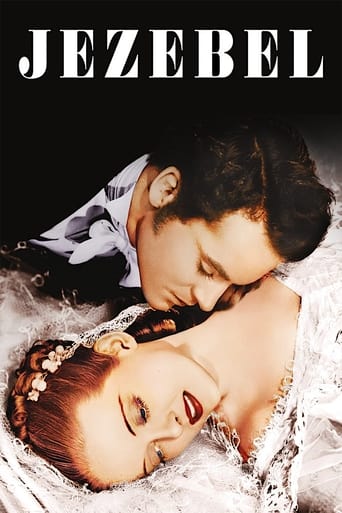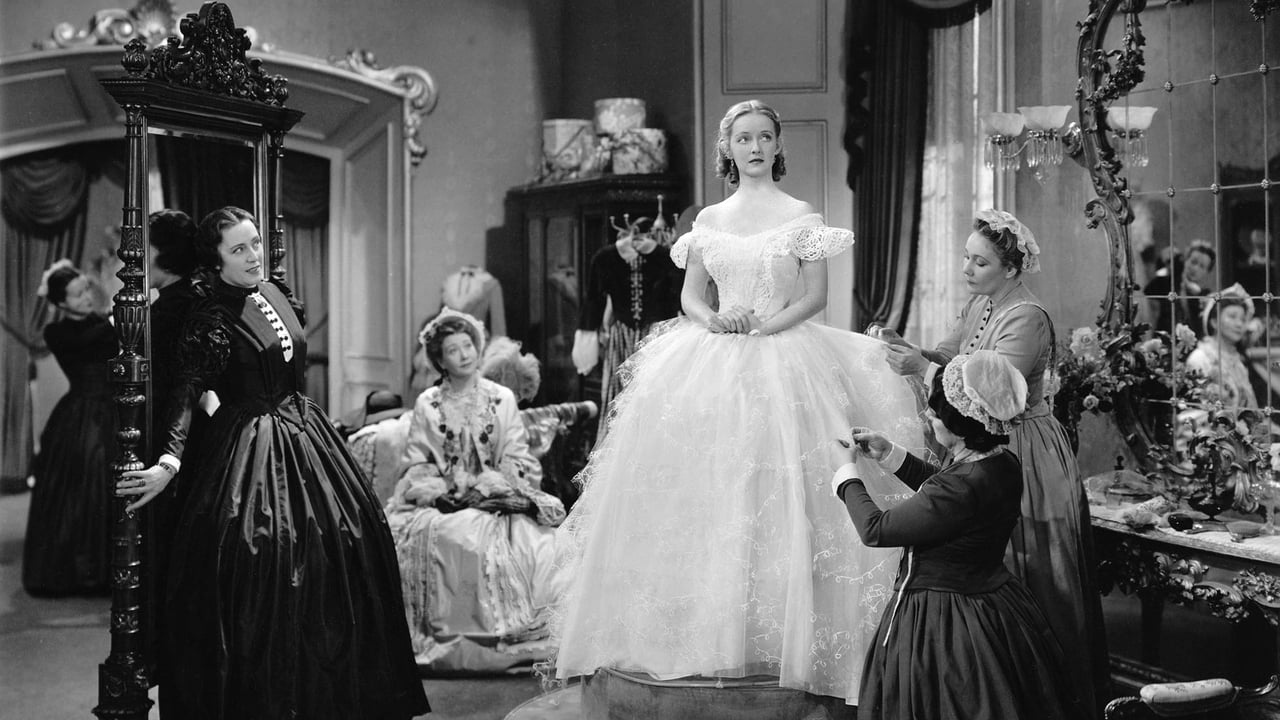Benedito Dias Rodrigues
Jezebel l watched for first time was in the early 80' and some years ago l purchase a copy with classic dubbed version,so today l revisited this good picture that was the response of Warner to MGM's Gone with Wind but the story isn't quite good...but Bette is fantastic and evil better than never and together with Henry Fonda hold the picture,another acting that deserve to be nominated is George Brent as ruthless man and Fay Bainter who won the Oscar as supporting role,l really liked this picture to exhibit the difference of thought between north and south on a period pre war!!!
Dunham16
The setting is New Orleans a decade before the outbreak of the civil war. Fay Bainter, Spring Byington, George Brent and Donald Crisp are stars today familiar playing generic southern gentlefolk. Bette Davis and Henry Fonda are the rebels of the Owen Davis play playing rebellious southern gentlefolk. Bette's Julie Marsden never at any time dresses or thinks or talks like a southern belle. Henry's Preston Dillon never at any time takes the mindset of a southern gent trying to keep the old ways in the face of commerce now favoring businesses in the north. Comlpeting this stunning, fascinating and brilliant portrait of the antebellum south are some of the finest tableaux in movie history of the period among them an excellent portrayal of a yellow fever epidemic and a stilted, possibly no longer universally culturally acceptable view of plantation house and field slaves content with their miserable lot. In terms of movie making the central issue advancing the cause of performers is the extraordinary contract of Henry Fonda apparently the first to release him on the date he agreed to sign to be home for the birth of Jane Fonda not remaining on the shoot until director William Wyler wrapped it. Not a general cup of tea for every audience today yet one of the most fascinating visually and dialogue wise, theme wise and plot wise Hollywood movies of all time.
jarrodmcdonald-1
The film is based on Owen Davis' play of 1933. Apparently, Owen Davis sets the story in 1850 (though I thought I heard Bette Davis' character say 1852 in the movie). There is a passage of time, such as the year between Pres and Julie's fight when Pres returns with a northern wife. So it would still be the early 1850s. But the great outbreak of yellow fever in New Orleans did not actually occur until 1905, way after the Civil War and reconstruction. Obviously, Owen Davis does not age these characters fifty years, and neither does director William Wyler in the film version. So unless there was an earlier epidemic, they are taking quite a bit of dramatic license with history.Also, a lot has been written about Jezebel in comparison to Gone with the Wind. And if we are, indeed, comparing the two, then what hurts Jezebel the most is its black-and-white photography. Imagine the impact that would have been made if the dress that Bette Davis' character wears to the ball had been shown in Technicolor. After all, it is a major plot point that she is wearing red of all colors, and the scene signifies the character's willingness to defy the conventions of proper society. And just like Tara in Gone with the Wind, we need to see the Halcyon plantation of Jezebel in all its colorful glory. Plus, the yellow fever scenes, with them riding off through the fire would have been bolstered by Technicolor. In many ways, though Bette Davis is the star of the picture, the story of Jezebel is an ensemble drama and most of the roles are well-written. The best scene is at the ball, where Julie, Davis' character, is forced to dance and make a spectacle of herself. There are lines in the film about questioning the value of tradition, and this scene illustrates that point most. Interestingly, when they come into the dance, the camera shows Henry Fonda's facial expressions as much, if not more, than Davis. The red dress seems to symbolize the fact that both of them (not just her) are no longer chaste, and that they are the most liberal couple in the community. However, he quickly renounces this as well as the idea of a future with her when he escorts her home. Again, the dress needed to be seen in bright Technicolor. It occurs to me as I write this that I am making a case for the colorization of this film. Usually, I do not condone such practices. If something was made in black-and-white years ago, then it is often best left in its original format. But Dark Victory was colorized in the 1980s, so why shouldn't Jezebel be colorized, too, especially as it would not handicap the filmmakers' creation. On the contrary, it would aid the work and its themes considerably.
zardoz-13
Bette Davis gives a memorable performance as the eponymous character in director William Wyler's "Jezebel," a tragic tale of rivalry and romance in antebellum Louisiana about a treacherous dame who defies society and flaunts custom to get what she wants. Miss Julie wants handsome banker Preston Dillard. Temperamental, vain, and sagacious, Julie lives to please only herself and to the devil with anybody else. Basically, this is a classic treatment of girl wants guy, girl loses guy, and girl wins guy back of the most unorthodox kind. ScenaristS Clements Ripley, Abem Finkel, and John Huston based their sensational screenplay on Pulitzer Prize winning playwright Owen Davis' drama and there isn't a moment that isn't gripping. Mind you, "Jezebel" is not only set in the pre-Civil War South, but it was produced in Hollywood during the Jim Crow era. The protagonist makes a disparaging remark about sullen African-Americans and Wyler presents the slaves as obsequious and ignorant in their happiness. However, though this casts a pall over the narrative, it doesn't detract from his evocative portrait of a woman who refuses to stop loving her man even when he has taken a marriage vow to another woman. Incredibly enough, "Jezebel" gives a fairly accurate depiction of the troubles that plagued the South in those days before the Civil War. Nobody gives a bad performance and George Brent is particularly good as Buck Cantrell, an arrogant, pretentious blow-hard who receives his comeuppance. Oscar-winning "Gone with the Wind" lenser Ernest Haller makes everything look appropriately cinematic and you can tell who occupies the moral high ground. Wyler stages the duel between Buck Cantrell and Ted Dillard in such a way as to generate undeniable suspense. "Jezebel" is simply brilliant.



 AD
AD





